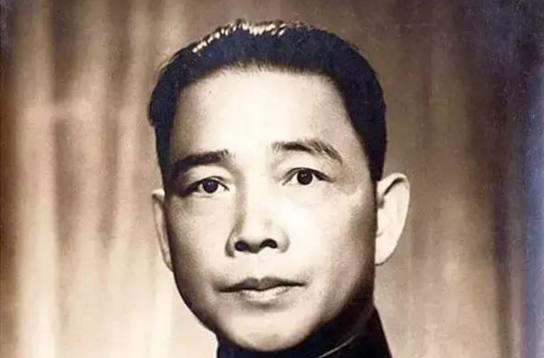During the War of Resistance Against Japanese Aggression, when Chiang Kai-shek gave a speech or held a meeting in public, he advocated "killing them quickly" against those traitors and traitors. This can be seen from the fact that he ordered Dai Kasa's military commander to set up a "hoeing team". However, what is surprising is that after Wang Jingwei, the number two figure of the Kuomintang, left Vietnam to surrender to the enemy, Chiang Kai-shek's attitude toward this "no. 1 traitor in Tianzi" was difficult for people to understand.

Wang Jingwei's headshot
On the one hand, in his diary, he was deeply disgusted with Wang Jingwei, and it was difficult to calm his hatred if he was not killed. However, in reality, he showed great generosity about Wang Jingwei's matter, set up steps for him many times, and even said that if Wang Jingwei was willing to come back, he could not blame the past. Even at the internal meeting of the Kuomintang that handled Wang Jingwei, he expressed his disapproval of arresting and bringing Wang Jingwei to justice. It is not difficult to see from these that Chiang Kai-shek at this time did not have a murderous intention against Wang Jingwei. So what exactly made Chiang Kai-shek make the decision that was completely opposite to that of his diary?
In the film and television drama, Chiang Kai-shek convenes an internal meeting of the Kuomintang
Chiang Kai-shek's reaction to this is actually not difficult to explain. First of all, although Wang Jingwei fled Vietnam, he did not openly surrender to the enemy at this time. Therefore, Chiang Kai-shek could not deal with Wang Jingwei in the same way that he dealt with other traitors. In addition, Wang Jingwei's status is very high, and at this time it has even reached the level of "one person above and ten thousand people below" (above one person refers to Chiang Kai-shek above, chiang kai-shek is the president of the Kuomintang, and he is the vice president of the Kuomintang). To a certain extent, it represents the face of the National Government, and considering that the ugliness of the family cannot be publicized, if old Jiang advocates killing Wang Jingwei, he will confirm the fact that Wang Jingwei surrendered to the enemy from the side, so that the face of the entire National Government will be lost.
Old Chiang's photo
The second point is that Wang Jingwei is the vice president of the Kuomintang, and although he has no real power, many major military and state affairs cannot do without his statement. Therefore, Wang Jingwei knew many military and political secrets within the Kuomintang. If he advocated killing Wang Jingwei before his surrender to Japan had become an established fact, Wang Jingwei would inevitably exchange the military and political secrets in his hands for the protection of the Japanese. Considering this, Chiang Kai-shek did not persecute him too much, and also took the initiative to set up a step for him in an attempt to pull Wang Jingwei back to the anti-Japanese camp.
The third point is that Wang Jingwei is a Cantonese native, has a very strong influence in the Cantonese army, and has a very good personal relationship with Long Yun, the head of the Yunnan clan. Chiang Kai-shek feared that if he advocated killing Wang Jingwei, he would cause dissatisfaction among the two families. In order to consolidate the interior, Chiang Kai-shek could not advocate the killing of Wang Jingwei when he did not surrender to Japan. Speaking of a thousand ways and ten thousand, the most important thing is that Wang Jingwei's investment in the sun has not yet become an established fact, and there is still the possibility of stopping the horse from the cliff.
Photo of Wang Jingwei's teenager
The fourth point is to take into account the morale of the army and the people; this was the most difficult period of the War of Resistance Against Japanese Aggression, with millions of casualties among officers and men on the front line, and the prospects of the military and the people at this time were very pessimistic about the prospects of the war. What will people think of the government? "If the government didn't look like an anti-Japanese fighter on the surface, but behind the scenes, it sent Wang Jingwei to Vietnam to negotiate with the Japanese army?" Once the people form such a mindset, what will happen next is a mass parade and an army mutiny. In this way, the already very difficult anti-Japanese resistance will be even more difficult. Formally based on this, Chiang Kai-shek cannot advocate the killing of Wang Jingwei and cannot let the masses know the fact that Wang Jingwei wants to surrender to the enemy. (Chiang Kai-shek told the masses that Wang Jingwei was only going to Hanoi to see a doctor, and his behavior had nothing to do with the government.)
Photo of Wang Jingwei
This kind of thinking of old Jiang continued until Wang Jingwei issued an open "yan telegram" of surrendering to the enemy. Upon learning the accurate news that Wang Jingwei had surrendered to the enemy, Chiang Kai-shek immediately ordered Dai Kasa to organize military commanders to carry out a "hoeing and treachery operation" against Wang Jingwei. However, it was too late, and Wang Jingwei, under the protection of his new boss, Niren, was already difficult to assassinate. Therefore, Chiang Kai-shek did not advocate killing Wang Jingwei at the beginning because his surrender to Japan was not a established fact. After Wang Jingwei's surrender had become an established fact, in order to forever bury the military and political secrets that Wang Jingwei knew in his belly, Chiang Kai-shek resolutely ordered "hoeing and adultery." It is not difficult to understand why Chiang Kai-shek had a diametrically opposed attitude before and after.